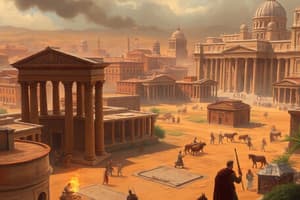Podcast
Questions and Answers
When did the Western Roman Empire have been replaced by Germanic kingdoms that eventually excluded Romans from holding power?
When did the Western Roman Empire have been replaced by Germanic kingdoms that eventually excluded Romans from holding power?
By 500 A.D.
Who established the kingdom of the Franks and what did he convert to?
Who established the kingdom of the Franks and what did he convert to?
Clovis established the kingdom of the Franks and converted to Christianity.
What did the Germans and Romans create as they intermarried?
What did the Germans and Romans create as they intermarried?
They created a new society.
What was the legal system based on?
What was the legal system based on?
What did the value of the fine depend on?
What did the value of the fine depend on?
What was an ordeal and what was it based on?
What was an ordeal and what was it based on?
When did Christianity become the dominant religion of the Roman Empire?
When did Christianity become the dominant religion of the Roman Empire?
What were a parish and a bishopric?
What were a parish and a bishopric?
What is the head of the Catholic Church known as?
What is the head of the Catholic Church known as?
What did Gregory I do to develop Christianity?
What did Gregory I do to develop Christianity?
What is the practice of living the life of a monk known as?
What is the practice of living the life of a monk known as?
What did monks become in the new European civilization?
What did monks become in the new European civilization?
What became the model for monasticism?
What became the model for monasticism?
When was most of Western Europe Catholic?
When was most of Western Europe Catholic?
What could women become in the Church?
What could women become in the Church?
Who was Pépin?
Who was Pépin?
Who was Charlemagne?
Who was Charlemagne?
Was the Carolingian Empire the largest European Empire in history at the time?
Was the Carolingian Empire the largest European Empire in history at the time?
When was Charlemagne crowned emperor of the Roman Empire by the pope?
When was Charlemagne crowned emperor of the Roman Empire by the pope?
What did Charlemagne's strong desire to promote learning and education refer to?
What did Charlemagne's strong desire to promote learning and education refer to?
Study Notes
Western Roman Empire and Germanic Kingdoms
- By 500 A.D., the Western Roman Empire was replaced by Germanic kingdoms, excluding Romans from power.
Kingdom of the Franks
- Clovis established the Frankish kingdom, becoming the first Germanic ruler to convert to Christianity and allied with the Roman Catholic Church.
Emergence of a New Society
- Intermarriage between Germans and Romans created a new society where family was the key bond, affecting the Germanic legal system.
Legal System
- Germanic legal system was based on the concept of wergild, a fine paid by the offender to the victim's family.
Variation of Fines
- Fines varied based on social status, with offenses against nobles costing more than those against slaves.
Ordeal as Legal Procedure
- The ordeal system established guilt or innocence through physical trials, based on beliefs in divine intervention.
Rise of Christianity
- By the end of the fourth century, Christianity became the Roman Empire's dominant religion, with a formal organization developing in the Church.
Church Hierarchy
- Local parishes led by priests formed bishoprics, overseen by bishops, ultimately falling under the authority of an archbishop.
The Pope
- The leader of the Catholic Church is known as the pope.
Pope Gregory I's Contributions
- Gregory I (590-604) strengthened papacy power, converting non-Christians and enhancing spiritual authority.
Monasticism
- The lifestyle of monks is known as monasticism, promoting religious and moral leadership in society.
Role of Monks
- Monks became revered figures, providing guidance as Christian heroes in new European civilization.
Saint Benedict's Influence
- Saint Benedict authored rules that served as the foundation for monastic living.
Spread of Catholicism
- By 1050, most of Western Europe had converted to Catholicism, largely due to the efforts of monks as missionaries.
Women's Roles in Monasticism
- Women could become nuns and reside in convents, which were managed by abbesses.
Pépin's Leadership
- Pépin was a chief officer in the Frankish kingdom who declared kingship for himself and his lineage, with Charles the Great as his son.
Charlemagne
- Charlemagne, or Charles the Great, was an intelligent leader who expanded the Frankish realm, establishing the Carolingian Empire.
Size of the Carolingian Empire
- The Carolingian Empire was the largest European Empire of its time, with Charlemagne sending missi dominici to enforce administration.
Charlemagne's Coronation
- Charlemagne was crowned emperor of the Roman Empire by the pope in 800, symbolizing the fusion of Roman, Germanic, and Christian elements.
Carolingian Renaissance
- Charlemagne's commitment to learning and education is referred to as the Carolingian Renaissance.
Studying That Suits You
Use AI to generate personalized quizzes and flashcards to suit your learning preferences.
Description
Test your knowledge with flashcards on Chapter 9, Section 1, covering the transformation of the Western Roman Empire and the rise of Germanic kingdoms. Learn about key figures like Clovis and their impact on history, including the conversion to Christianity and alliances with the Roman Catholic Church.




